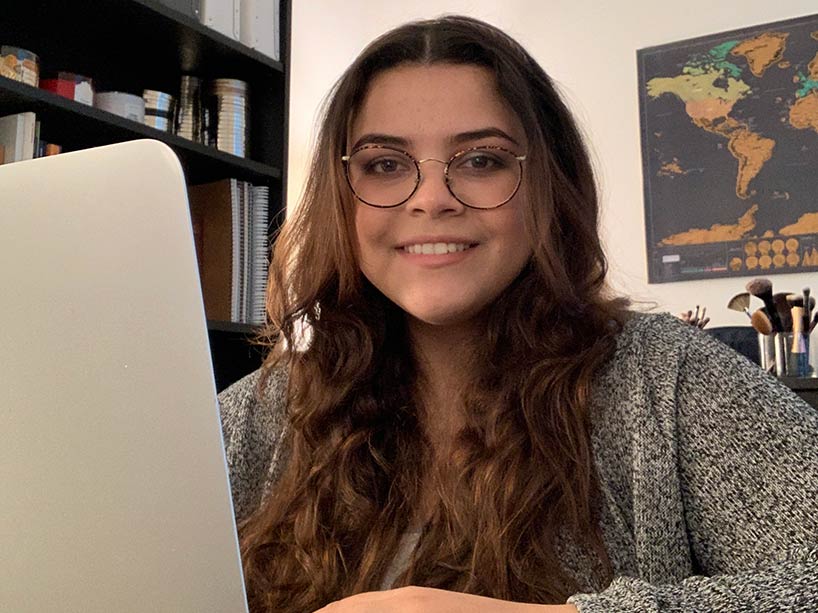‘It takes a village’ to support international students during COVID-19

Monica Salloum suggests having a dedicated space, creating daily agendas and hourly schedules to stay productive.
“When I first visited Ryerson, I felt like everybody was just so calm. Like, there was this calmness everywhere,” said Toluwani Adeniyi, a first-year international student from Nigeria studying psychology. Adeniyi came to Toronto in the summer of 2019 to visit her cousin and immediately knew she wanted to attend Ryerson University.
Little did she know that when the time came for her to start her first semester at the university this fall, she would remember that feeling as the calm before the storm. The onset of pandemic-induced uncertainty and social distancing forced Adeniyi to attend classes virtually from her home in Abuja.
For Monica Salloum, a fourth-year political science student from Lebanon who is currently in Toronto, the decision to attend Ryerson became easy after her first few interactions with the administration staff, as she realized that the university had the necessary resources, and more importantly the right culture, to support international students during their transition to a new life.
“I was very insecure about being foreign, and dealing with immigration and all the paperwork. But what really intrigued me about Ryerson was that I felt like it had a very supportive culture for international students,” said Salloum.
Over the course of 2020, Ryerson’s International Student Support (ISS) office has handled the herculean task of making sure that more than 4,000 international students at Ryerson continue to feel like they made the right choice, and that the university remains well-equipped to provide them with essential support during a global crisis.

Toluwani Adeniyi thinks she was meant to be at Ryerson after her cousin recommended the university to her.
Overcoming personal challenges
For students staying in their home country, the hope of experiencing an international education and gaining international exposure seems lost, or at the very least, delayed. Those who moved or continued to stay in Canada found themselves in two places at once – dealing with feelings of isolation while worried for their loved ones’ safety back home.
“In comparison to a lot of students I know at other universities and in the United States, I still feel very supported at Ryerson, both personally and professionally,” Salloum said. For example, she shared the feelings of trauma that the Lebanese community struggled with after the Beirut blasts in August.
“I received direct emails from the ISS office, just asking how I am and reminding me of all the resources that were available to me like counseling and therapy, and it was extremely important to hear that. It was an amazing emotional support,” she said.
For Adeniyi, remote learning has become a cushion for the culture shock she expected to experience had she moved to Toronto.
“Coming from a different culture, there are so many things that are done differently at Ryerson. I don’t know how well I would assimilate if I was there in person,” Adeniyi said. “But now that it’s online, I can already tell what the experience is going to be like and the shock is reduced. I’m also seeing what my classmates are like before I get to meet them. I want to be there physically, I just think this is giving me preparation time.”
ISS is exposing international students to Toronto and the Ryerson campus in creative ways. From a virtual scavenger hunt, videos of the ISS team introducing their favourite places in the city with pictures, describing certain things or events in the city that they look forward to each year, and current students sharing their experiences and providing tips for living in Toronto or going to Ryerson, the office is helping spark curiosity and excitement among new students – giving them something to look forward to.
Uncertainty about the future
When Ryerson went virtual back in March, ISS was quick to make its in-person services available to students virtually. “We valued communication. We communicated early with students to inform them of what exactly was happening, and provided the information we could at the time,” said Lyn-Marie Farley, manager of ISS.
ISS also created a COVID-19 FAQ page and sent biweekly communications to all current international students to help them understand the implications of the changes being implemented by Immigration, Refugees and Citizenship Canada (IRCC) on their status in Canada.
“I had to choose between staying in the country and securing my immigration status, or going back home to visit my family,” said Salloum. She ultimately decided to stay in Canada because she thought going home amid the uncertainty around border regulations would jeopardize her future here.
Students hoping to graduate next year are also concerned about changes to Canadian immigration laws, and whether they will be able to continue living in the country after graduation. “Although many students were hoping to gain work experience, they don’t think they will be able to anymore and are considering enrolling in a master’s program instead,” said Salloum. “But it’s a difficult decision to make because sometimes, financially that’s not an option.”
To ease some of the financial burden on international students, the ISS made its emergency bursary available till May. In total, more than $87,300 in relief funding was provided to students, with an additional $34,000 through other bursaries offered by ISS. The Ryerson University Student Relief Fund also provided another $353,250 to support international students in the wake of the pandemic.
Seeking connections and embracing cultural differences
When asked if Ryerson is doing enough to help her transition and feel connected to the community, Adeniyi said, “I personally think they’re doing a lot. They’re trying to take away the idea that because we’re virtual, we can’t interact, and are aware of all our needs, especially our social needs. I want to join the peer mentoring program and the Psychology Students’ Association.”
ISS runs peer social programs throughout the year to help build community for international students through social activities, and its Let’s Talk series facilitates conversations about shared experiences and personal development. This fall, the office is also partnering with the Tri-Mentoring program to introduce international graduate student mentoring.
“International students have their insecurities and having a sense of community helps,” said Salloum. “The Cultural Connections program helped me connect with students from all over the world, and it normalized being from a different background and coming from different cultures. It can help those who feel intimidated,” she added.
Keeping in touch with yourself and others
This semester, ISS is focusing on health and wellness. Through a partnership with the Recreation and Athletic Centre (RAC), ISS launched a program called Strong Body Strong Minds to provide students exercises and strategies to engage their minds with their bodies.
“It takes a village to support international students,” said Farley. “We partner with other on-campus programs a lot. We’re planning a winter survival session for international students, and also partnering with the Career and Co-op Centre to give students insight into the Canadian workplace culture and navigating the current job market.”
For more information on the services offered by International Student Support, please visit the ISS website.